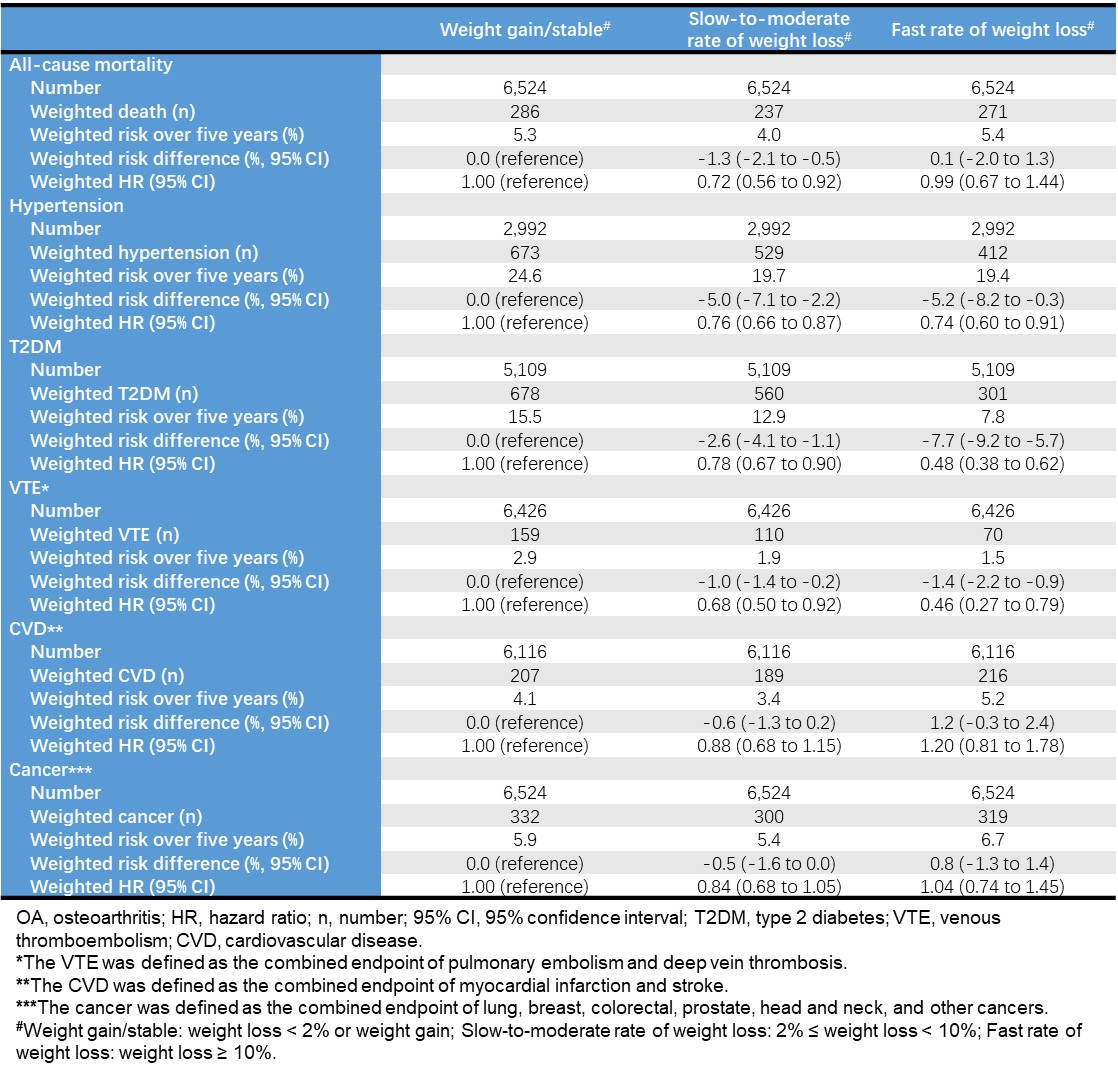Session Information
Session Type: Poster Session C
Session Time: 9:00AM-11:00AM
Background/Purpose: The current international guidelines recommend weight loss for pain relief and functional improvement in overweight or obese patients with knee or hip osteoarthritis; however, there is a paucity of data on the relation of weight loss to all-cause mortality among patients with osteoarthritis. We aimed to examine the relation of the rate of weight loss induced by anti-obesity medications over 1-year to all-cause mortality among overweight/obese patients with knee or hip osteoarthritis.
Methods: Using IQVIA Medical Research Database in the United Kingdom, we identified overweight/obese people aged 40 years or older with knee or hip osteoarthritis. We emulated analyses of a hypothetical target trial using a “cloning, censoring, and weighting” approach to assess the effect of slow-to-moderate (2-10%) or fast (≥10%) weight loss induced by the initiation of anti-obesity medications (i.e., orlistat, sibutramine, and rimonabant) within 1-year on all-cause mortality and several secondary outcomes (i.e., incident hypertension, type 2 diabetes, venous thromboembolism, cardiovascular disease, and any cancer) over 5-year follow-up, respectively (Figure 1).
Results: Among 6,524 participants initiating anti-obesity medications, the 5-year all-cause mortality was 5.3%, 4.0%, and 5.4% for “weight gain/stable”, “slow-to-moderate weight loss” and “fast weight loss” arms, respectively. Compared with the “weight gain/stable” arm, hazard ratios (HRs) of all-cause mortality were 0.72 (95% confidence interval [CI]: 0.56-0.92) for the “slow-to-moderate weight loss” arm and 0.99 (95%CI: 0.67-1.44) for the “fast weight loss” arm, respectively. In addition, we found dose-response protective effects of weight loss on incident hypertension, type 2 diabetes, and venous thromboembolism. However, a slightly higher risk of cardiovascular disease, albeit non-statistically significant, was observed in the “fast rate of weight loss” arm compared with the “weight gain/stable” arm (HR=1.20, 95%CI: 0.81-1.78). No apparent difference in the risk of cancer was observed between the “fast rate of weight loss” arm and the “weight gain/stable” arm (HR=1.04, 95%CI: 0.74-1.45) (Table 1).
Conclusion: In this population-based study, a slow-to-moderate, but not fast, rate of weight loss induced by anti-obesity medications within 1-year is associated with a lower risk of all-cause mortality in overweight/obese people with knee or hip osteoarthritis. Our findings that gradual weight loss by anti-obesity medications lower all-cause mortality, if confirmed by future studies, could guide policy-making, and improve the well-being of overweight/obese patients with knee or hip OA.
To cite this abstract in AMA style:
Wei J, Hunter d, Lane N, Wu J, Zeng C, Lei G, Zhang Y. Weight Loss Induced by Anti-obesity Medications and All-cause Mortality Among Patients with Knee or Hip Osteoarthritis [abstract]. Arthritis Rheumatol. 2023; 75 (suppl 9). https://acrabstracts.org/abstract/weight-loss-induced-by-anti-obesity-medications-and-all-cause-mortality-among-patients-with-knee-or-hip-osteoarthritis/. Accessed .« Back to ACR Convergence 2023
ACR Meeting Abstracts - https://acrabstracts.org/abstract/weight-loss-induced-by-anti-obesity-medications-and-all-cause-mortality-among-patients-with-knee-or-hip-osteoarthritis/


